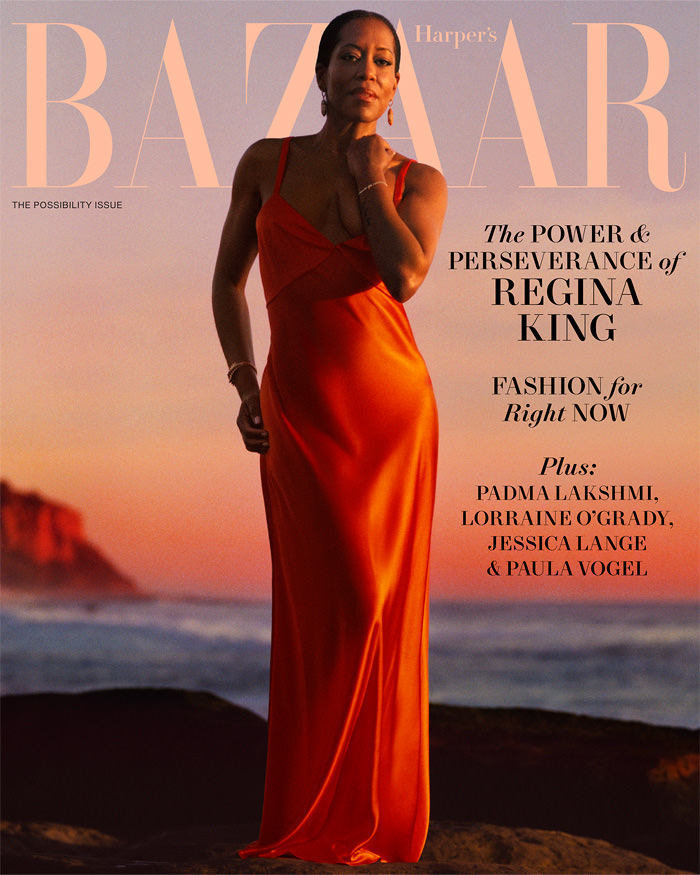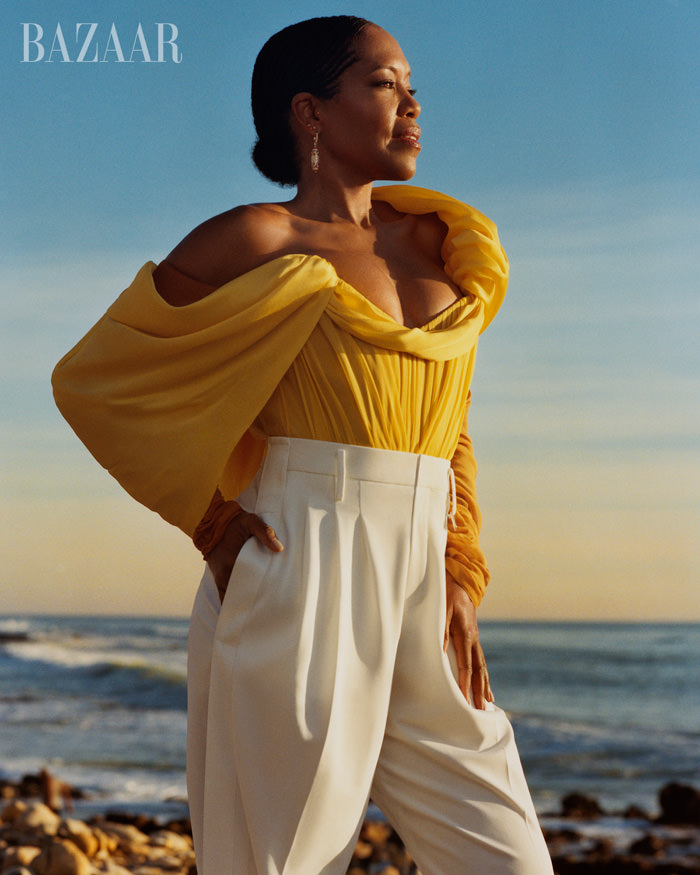
Regina King covers HARPER’S BAZAAR April 2024 ‘Possibility’ issue photographed Luis Alberto Rodriguez by and styled by Salamishah Tillet.


On her son’s struggle with depression:
“When I look at all of the work and everything that we and Ian put into trying to move through the depression … I mean, he’s pure joy and pure light,” she says, slipping for a moment into the present tense. “But he was struggling so much. We knew. We knew what we were going through, but he never presented that way. That’s why I know that a smile doesn’t always mean happy. He would never not let whoever he was with feel like they were the most special person in the world. So for me, I’m like, ‘Man, he was putting a lot into things, a lot into people, a lot into this world, and yet it wasn’t translating back,’ ” she says.
On feeling the absence of her son, Ian, after his death:
“If I was told, ‘Do you want to do this again, but it’s going to be exactly the same?’ I would say yeah, just because of how much Ian gives me,” King continues. “But right now, it is me trying to better understand this new relationship with Ian that the universe has chosen. We always talk about spirit: They’re always with us in spirit. But his physical absence is so loud that it’s hard to sometimes tap into that spiritual connection.”
On processing her profound loss:
“One of the things I’ve learned on this journey is that gratitude and sadness are not mutually exclusive; they’re always working at the same time,” King says. “I just have to navigate this. Sometimes it’s minute by minute. I’m aware when I talk to other mothers—and I hate that we share this because I feel like I don’t want anyone to share this, but because we do share it, they have just taught me so much. Having those women in my life reminding me of the importance of not isolating—because it’s really easy to isolate, especially when the majority of people in the world have no idea whatsoever of this level of grief. But talking to women who are like, ‘It’s not going to go away.’ At least I know that. … One thing that I feel like every mother that I talk to feels like is that no one could have prepared me for this. No one told me this part. There’s something about them, 11 years, 12 years later—the grief is still there. So at least I know. I do know that. And I think even without them telling me that, I feel that inside. I think they just confirmed that for me. I read somewhere that grief is love with no place to go, and I was like, ‘Huh … yeah … that does sum it up in some way.’ ”
On reconvening to finish shooting Shirley a few months after her son’s passing:
“I know Ian would have felt like if I didn’t finish something because of a choice that he needed to make, then I wasn’t honoring him,” King says. “We all landed at the finish line on Ian’s wings. He guided us there.”
On her atypical success that typically burns out child actors:
“I would say that I didn’t not expect it in my career,” King offers, “and I wouldn’t say that I expected it.”
On seeking out roles and characters she can connect with:
“I feel like whether it’s a comedy or a drama, people should feel like there’s something in there that’s relatable,” she says. “The Godfather is one of my favorite films of all time. Do I know anything about killers and murders and the Italian Mafia? No. But do I know family? Do I know about going to any length to protect your family or what you feel is rightfully yours? I truly understand that. So I can go on the ride.”
On being able to tell Shirley Chisholm’s story:
“We’d both had too many experiences where friends had never heard of Shirley Chisholm,” King tells me. “We all know women who roll up their sleeves and are able to go toe-to-toe with men—Black women,” she says. “We know they exist, but we don’t get to see them out in the storytelling space,” she explains. “Shirley understood the game of politics, even though people’s lives were not a game to her.”
On exploring roles where the Black women she inhabits are powerful but never stereotypical:
“What I do know is that I do gravitate toward stories that are just interesting to me as an audience. … I’m always thinking, ‘Can I believe her, the character? Is she real to me? Can I root that character in truth?’ ”
[Photo Credit: Luis Alberto Rodriguez for Harper’s Bazaar Magazine]
Lorenzo’s Picks for the BEST Tote Bags for Spring 2024 Next Post:
NAACP Image Awards 2024: Halle Bailey in Nicole + Felicia Couture
Please review our Community Guidelines before posting a comment. Thank you!



